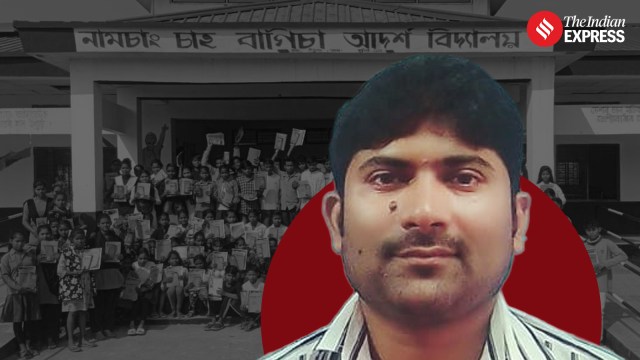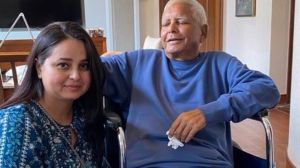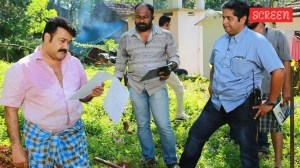On a typical morning, as the sun rises over Assam’s tea gardens, Debajit Ghosh sets out on a long and arduous journey. Nearly 150 km of travel lies a route that cuts through the Dihing Patkai National Park, where the risk of elephant crossings is real and roads often turn into muddy stretches when it rains. Yet, none of this deters the 34-year-old, who remains committed to reaching his school and teaching children who once had to drop out after the primary level.

When asked why he continues to live in Dibrugarh despite the exhausting commute, Ghosh said, “If I do not stay here, it will not be possible to carry out the developmental work at Namsang Tea Estate Model School. I need to send documents to the office regularly, and my wife also works in Dibrugarh. Moreover, I bring along two other teachers in my car, while the rest travel by bike, as there is no direct public transport to the school.”
 Road to the school
Road to the school
It is this dedication that has earned him a place among 45 teachers who will be honoured with the National Teachers’ Award 2025 by President Droupadi Murmu on September 5. His story — from a small town in Assam’s Sonitpur district to a national platform — embodies resilience, innovation, and the belief that one teacher can transform an entire community.
Story continues below this ad
Ghosh’s career took root in 2013 when he joined Dibrugarh Bengali High School as a graduate teacher. A defining moment came when Abhishek, a curious Class 8 student, scored poorly in science. He dug deeper to find out that the student disliked writing. With mentorship and motivation, the student not only improved but scored 100 in Science and 93 per cent overall in the Assam board Class 10 matric exam. Such experiences cemented his belief in nurturing curiosity rather than focusing only on marks.
Today, Ghosh serves as the principal of Namsang Tea Garden Adarsha School, established in 2022 in Upper Assam’s tea estate area. For the first time, children from tea garden communities — many of whom once dropped out after primary school due to the absence of nearby secondary schools — are attending regular classes. In just two years, the school has brought more than 300 out-of-school children back to classrooms. From 32 students in its first HSLC batch, only 14 cleared, but the very next year 18 of 20 passed, pushing success rates to 90 per cent.
 Ghosh braves a challenging road to school through the Dihing Patkai National Park, often with elephants crossing the way
Ghosh braves a challenging road to school through the Dihing Patkai National Park, often with elephants crossing the way
Explaining the situation before the school’s establishment, Ghosh said, “Earlier, the children of the tea garden had to leave school because there was no high school within a 15 km radius. The nearest one required crossing the Dehing Patkai National Park, which was extremely risky.”Ghosh braves a challenging road to school through the Dihing Patkai National Park, often with elephants crossing the way
Story continues below this ad
The new school changed that. “For the first time, children from the tea gardens had access to secondary education nearby,” Ghosh explains. “In its very first year, we saw 271 students enroll, the youngest 11 and the oldest 18. By the second year, enrolments rose to 326.”
 267 dropout students were brought back to normal education in 3 years
267 dropout students were brought back to normal education in 3 years
Journey to the award
When news came that he was selected for the National Teachers’ Award, he was overwhelmed. “It was a mixed feeling. I was very happy and emotional too, remembering my past. My father and mother worked very hard for my education. My uncle Late Tarit Ghosh who also helped me a lot in this journey.”
What sets Ghosh apart is his commitment to blending innovation with empathy. Inside classrooms, he focuses on “learning by doing,” encouraging experiments, toy-making, and practical sessions. He integrates technology through ICT tools, virtual labs like O-Lab, and 3D websites such as MSD that display human anatomy. “Students today are tech-savvy. If you deliver monotonous lectures, they will never listen. But if you show them concepts interactively, they engage with joy,” he says.
Outside the classrooms too, his interventions have been equally impactful. Under the Rashtriya Bal Swasthya Karyakram (RBSK), he organised a health camp and discovered that most of his students suffered from low haemoglobin. He monitored their progress and ensured they received iron and folic acid tablets, as well as deworming treatment. Within three years, haemoglobin levels in the community improved significantly.
Story continues below this ad
He also tackled one of the toughest challenges in rural education — dropouts. Over three years, he successfully brought 267 children back into mainstream education, many of whom had left to work in tea plantations. “Convincing parents was as important as teaching students. Once they saw results, they too began believing in the power of education,” he says.
On being asked whether students who pass Class 10 continue their studies, Ghosh said, “Our students have taken admission in Class 11 and are continuing their education. I stay in touch with all of them. University and college professors often visit to explain what higher education offers, and at regular intervals we bring in people from outside to motivate the students.”
 His teaching innovations include learning by doing, use of ICT, virtual labs
His teaching innovations include learning by doing, use of ICT, virtual labs
Creativity remains at the core of his practice. “Students are given free hand to show their creativity in practical classes, toy-making sessions, and various orientation programmes.” He insists on hands-on learning, even encouraging students to learn through their five senses. This approach makes them proactive participants.
His work has changed lives. He recalls the story of the Class 8 student Abhishek, who struggled with writing. Instead of letting him fall behind, the teacher introduced oral assessments, slowly helping him improve writing skills. Abhishek developed a deep interest in science, often visiting his teacher’s home to clarify doubts. Despite financial struggles, the student is now pursuing a PhD in Mathematics from a reputed university.
Story continues below this ad
Challenges, however, remain. He admits that the toughest part for teachers today is adapting to rapidly evolving technology. “If you deliver monotonous content in classroom, students are never going to listen to you.” He strongly believes in balancing syllabus completion with real skills: once students develop learning skills, syllabus coverage becomes easier.
Asked how he wants to be remembered, he says: “As a teacher who not only taught them but also mentored them in the most crucial stage of their life.”
For aspiring teachers, his advice is clear: “Prepare yourself not only to teach but also to cater to the needs of your students in every aspect. Learning is continuous — you must be aware of recent developments to deliver your best.”
When asked if he seeks any further support from the government, Ghosh said, “Recently, we received a teachers’ quarter, a science lab, and a library. It would be very helpful if a sports teacher could also be appointed. My transportation expenses are very high, so a contingency fund is needed. A school in the plains and a school in the hilly areas cannot function effectively with the same grant.”



 Road to the school
Road to the school Ghosh braves a challenging road to school through the Dihing Patkai National Park, often with elephants crossing the way
Ghosh braves a challenging road to school through the Dihing Patkai National Park, often with elephants crossing the way 267 dropout students were brought back to normal education in 3 years
267 dropout students were brought back to normal education in 3 years His teaching innovations include learning by doing, use of ICT, virtual labs
His teaching innovations include learning by doing, use of ICT, virtual labs




























